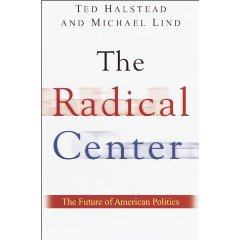1) More Americans identify themselves as Independents than as either Republicans or Democrats, and the way is open for a new “radical centrist” choice of leadership;
2) The original social contract that placed highly educated experts in charge of everything (government, corporations, even non-profits), taking care of the largely ignorant masses, is *history*. The people are smart, the people are connected, and the people want *choices* rather than ideologically-contrived menus.
3) Young adults are the key to the future and will decide the next few major elections, but only (a huge caveat) if leaders of vision and charisma can come forth with truthful options grounded in reality–the authors are carefully critical of political “triangulation” that seeks to manufacture false representations of common interest, only to betray those the moment after election.
The bottom line in this book is that the artificial trade-offs imposed on the people by menu- and elite-driven party politics are no longer acceptable nor enforceable, and the opportunity now presents itself for the voting public to remake the government from the outside in.
They focus on the core segments and core values that make America great: the market with its liberty; the state with its equality of opportunity; and the community (including religions) with its solidarity and nurturing of civic virtues.
Among the core negatives they identify where citizens could and should be free to choose rather than accept imposed combinations, are:
1) Elections tied to rigid political parties that have veto rights over candidates, and selections that allow minority winners where more than two candidates split the majority vote.
2) Pension and health care programs tied to organizations rather than individuals–trapping individuals and constraining innovation.
3) Educational systems tied to mass conformity rather than individual customization–with gross inequalities across counties and states because property taxes fund education, rather than a national normalized program with equal investments for every child.
4) Tax systems tied to loopholes, patronage, and earnings, rather than to consumption and savings (tax breaks for savings).
5) Immigration policies tied to old needs for low-skilled labor instead of new needs for high-skilled labor and the protection of the nation from dilution, disease, and excess demands on our tax-payer funded safety nets.
There are many other gems in this well-written and self-effacing book. The authors come across as very sensible, very devoted to America and its values, and very much ahead of the curve.
They conclude that major renovations of our society usually result from a combination of three factors: an external shock to the system; the emergence of new political alliances, and the availability of compelling new ideas for social reform.
They specifically note that an obstacle to innovation is the lack of a well-formed political worldview among both the new generation of young voters, and the new elites (most of whom have eschewed politics).
While they say that realignments are not excepted in the next presidential or congressional cycle, but rather over the next ten to twenty five years, I believe they underestimate the power of the Internet and self-organizing groups such as represented by the Cultural Creatives.
I hope the authors consider launching a “Journal of Citizen Governance” and a web-site where citizens' can self-organize, because unlike the cultural creatives and the imaginative individuals who focus in niche areas, these two authors have finally “cracked the code” in a common sense manner that anyone can understand and anyone can act upon.
This is a unique and seminal work that could influence the future of national, state, and local politics, and hence the future of the Nation. This is *very* well done.





